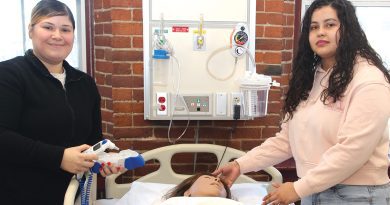When Is the Best Time to Have Cataract Surgery?
Clear-eyed Decisions
By MASSACHUSETTS EYE AND EAR
In most cases, the timing of cataract surgery depends on your lifestyle, symptoms and personal preference.
Cataracts are a normal part of aging. They form when the clear lens inside the eye hardens and becomes cloudy. Most people experience very gradual symptoms or changes in vision over several years.
“Not everyone needs to have surgery right away. But if changes in your vision affect your daily life, or if you have a type of cataract that develops quickly, it may be time to consider surgery.”

Other types of cataracts — although less common — may develop if you’ve had an eye injury or eye surgery, take certain medications, have diabetes or spend a lot of time in the sun.
For many who develop cataracts, the most difficult question is when to have surgery.
According to Dr. Katie Luo, a cataract specialist practicing at Massachusetts Eye and Ear’s Longwood location, this is a personal choice. “Not everyone needs to have surgery right away. But if changes in your vision affect your daily life, or if you have a type of cataract that develops quickly, it may be time to consider surgery,” she said. “Ideally, it’s a choice you make with the help of your eye surgeon after weighing the risks and benefits.”
Here are some important things to consider before booking your cataract surgery:
Do Cataracts Interfere with Daily Life?
“First, your eye surgeon will want to know if changes in your vision affect your daily activities,” Luo explained. “We take into account both your symptoms and your lifestyle, because everyone relies on their vision for different things. For instance, the needs of a professional truck driver are very different from someone who uses a computer all day.”
Surprisingly, it’s not always easy to gauge your symptoms. For one thing, it can be difficult to tell the difference between cataract symptoms and normal signs of aging. Other times, the symptoms may be so gradual that you don’t even realize you have a hard time seeing.
That’s why Luo focuses on her patients’ ability to perform certain tasks.
“The number-one complaint people with cataracts have is difficulty driving, especially at night,” she said, adding that patients often report being sensitive to glare or seeing halos around bright lights. As a result, they may avoid driving at night altogether.
Another common symptom is difficulty reading, even while wearing reading glasses. Patients typically find they need more light or a bigger magnifier to see clearly.
Many patients also find that their eyeglass prescription needs to be changed frequently. “It’s not uncommon for patients to get new glasses and then suddenly have difficulty seeing again six months later,” Luo explained.
Other signs might include clouded, blurred, or dim vision.
How Fast Are Your Cataracts Progressing?
Most age-related cataracts develop slowly, while other types may develop more quickly and require prompt treatment. For instance, an eye injury can cause a traumatic cataract in a matter of months. And some medications, like steroids, can also lead to rapidly growing cataracts.
Do You Have Glaucoma?
If you have both cataracts and glaucoma — a group of eye diseases that damage the optic nerve — you may have more options to consider.
If you have early signs of glaucoma, cataract surgery alone may be recommended. Studies have found that cataract surgery can help to lower pressure inside the eye and prevent more nerve damage. That’s because the artificial lens is smaller than the cataract, which can improve fluid drainage in the eye.
If you have more advanced glaucoma that is not well-controlled with medications, your doctor may recommend having glaucoma and cataract surgery at the same time.
“As always, it’s important to talk with your doctor to determine the best option for you,” Luo said.
Is It OK to Delay Cataract Surgery?
In most cases, there is no harm in delaying cataract surgery for a while. But don’t wait too long. As a cataract matures, it hardens and can be more difficult to remove.
Luo stressed the importance of being proactive about your eye health. “If you think you might have cataracts, don’t delay your eye exam. Your eye doctor is your best resource. He or she can help you decide if and when you might need surgery.”
Your eye doctor can also help calm any fears about surgery. “In my experience, most patients delay surgery because they’re afraid of losing vision or that it’s going to be painful,” she explained. Today, more than 95% of cataract surgeries are successful — making it one of the safest surgeries. And there is minimal, if any, pain during and after surgery.
“The more trust you have in your surgeon,” Luo said, “the less anxiety you will have.” v
Katie Luo, M.D., Ph.D., is an ophthalmologist in the Comprehensive Ophthalmology and Cataract Consultation Service at Mass. Eye and Ear, Longwood. She does routine and complex cataract surgeries, laser vision procedures, and cornea surgeries. She also directs Project Gafas, a global health initiative to provide donated glasses to underserved populations.



